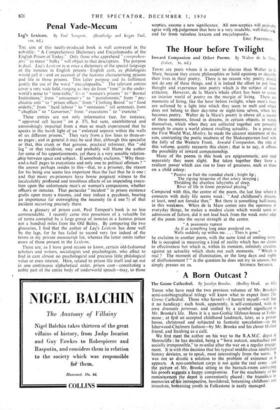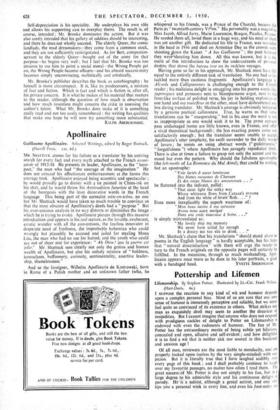A Born Outcast ?
The Goose Cathedral. By Jocelyn Brooke. (Bodley Head. 9s. 6d.) THOSE who have read the two previous volumes of Mr. Brooke's semi-autobiographical trilogy will know what to expect from The Goose Cathedral. Those who haven't—I haven't myself—will find it no handicap ; each book, apparently, is self-contained, with its own dramatis personae, and unified by a symbol significant in Mr. Brooke's life. Here it is a neo-Gothic lifeboat-house at Folke- stone ; at fu-sT an accepted childhood landmark, later, as a private house, christened and subjected to fantastic speculation—in the Isherwood-Chalmers fashion—by Mr. Brooke and his clever Oxford friend, and finishing as a café. We first meet the author on his way to the R.A.M.C. depot at Shorncliffe ; he has decided, being a " born outcast, unattached and socially irresponsible," to re-enlist after the war on a regular engage- ment. It is with this decision that his typical middle-class intellectual history deviates, so to speak, most interestingly from the norm. It was not so drastic a solution to the problem of existence as it appears. A non-combatant corps is not quite the real army : and the picture of. Mr. Brooke sitting in the barrack-room correcting his proofs suitge.sts a happy comprothise. For the machinery of his reminiscences the depot is conveniently placed ; the transition to memories oftitis 'introspective, bewildered, botanising childhood and irresolute, bothnising youth in Folkestone is easily managed. Self-depreciation is his speciality. He underplays his own role and allows his supporting cast to overplay theirs. The result is, of course, intended - Mr. Brooke dominates the action. But it was also surely intended that his gallery of oddities should be interesting, and there he does not wholly succeed. The elderly Queer, the comic landlady, the mad dressmakersT-they come from a common stock, and they are not sufficiently reinvigorated. As for Bert, companion- serVant to the elderly Queer—bought out of the army for that purpose—he begins very well ; but 1 feel that Mr. Brooke was too anxious to use him to point a social moral—the Wrong People get on, the Wrong People become officers—and his absurd success-story becomes simply unconvincing, realistically and artistically.
Mr. Brooke's publisher describes the book as autobiography ; he himself is more circumspect. It is, like its predecessors, a mixture of fact and fiction. Which is fact and which is fiction is, after all, his private concern. It is what he makes of his material that matters to the reader, although the question of how much is observation and how much invention might concern the critic in assessing the author's talent. What Mr. Brooke does make of it is something easily read and not too easily remembered ; the writing has qualities that make one hope he will now try something more substantial.
RALPH ABERCROMBIE.







































 Previous page
Previous page